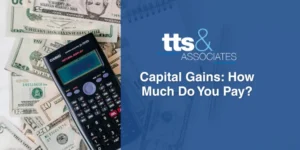If you’re a Victorian business owner wondering how to reduce tax when selling your business, understanding small business CGT concessions is essential. These tax reliefs, outlined in Division 152 of the Income Tax Assessment Act, can help eliminate or significantly reduce capital gains tax (CGT). Here’s what you need to know.

What Are Small Business CGT Concessions?
Small business CGT concessions are a set of tax benefits available to eligible small businesses that dispose of active assets. These concessions apply whether you’re selling the business itself or major components like goodwill, commercial premises, or equipment.
The ATO’s CGT Concessions Guide provides a clear summary, but professional advice is strongly recommended.
Basic Eligibility Conditions
Before applying any concession, you must meet the basic conditions:
- Business Size:
- Aggregated turnover under $2 million, or
- Net asset value under $6 million.
- Active Asset Test:
- The asset must have been actively used in the business for at least 50% of the ownership period (or 7.5 years if held for over 15 years).
- Shares or Units:
- For shares in a company or units in a trust, you or your spouse must hold at least 20% of the voting rights or interests.
- Asset Use:
- The asset sold must be connected to the business, not held passively.
The Four Concessions Explained
1. 15-Year Exemption
If you’re aged 55 or older and retiring, and you’ve owned the active asset for 15 years or more:
- Entire capital gain is tax-free.
- Applies to individuals, trusts, and companies.
2. 50% Active Asset Reduction
- Reduces capital gain by 50%.
- Available regardless of age or retirement status.
3. Retirement Exemption
- Up to $500,000 lifetime limit per individual.
- If under 55, the exempt amount must be rolled into super within 7 days.
4. Rollover
- Defers CGT if you reinvest in another active asset within 2 years.
- Partial or full deferral allowed.
Correct Concession Stacking Order
Applying these concessions in the right order is crucial. The ATO mandates the following sequence:
- 15-Year Exemption (if eligible)
- 50% Active Asset Reduction
- General 50% Discount (for individuals/trusts)
- Retirement Exemption or Rollover

Using a spreadsheet or tax software to model outcomes ensures you don’t overpay CGT.
Real-World Example
Louise’s Graphic Design Studio
- Business structure: Family trust
- Sale price of goodwill: $600,000
- Capital gain: $300,000
- Owned and actively used for 8 years
- Turnover: $1.2 million
Outcome:
- 50% Active Asset Reduction → $150,000
- General 50% Discount → $75,000
- Retirement Exemption → $0 CGT (Louise rolls $75,000 into super)
Louise pays zero CGT and boosts her retirement savings.
Documentation Essentials
Ensure you maintain and produce:
- Financial statements supporting turnover/net asset values
- Trustee or board minutes evidencing active use
- Signed election forms for retirement exemption and rollover
- Valuations for assets and goodwill
Victorian Duties and Double Tax Planning
If you’re selling real estate or business property, you may also trigger Victorian land transfer duty (stamp duty). Unlike CGT, these costs are not affected by the concessions.
It’s important to model both federal and state taxes when selling business property.
Pre-Sale Planning Timeline
| Timeframe | Action |
|---|---|
| 24 months out | Confirm active asset use and restructure if needed |
| 12 months out | Obtain independent valuations, consult adviser |
| Contract date | Include clauses allocating price between assets |
| Settlement | Deposit rollover funds or super within 7 days |
Proactive planning well in advance of sale ensures compliance and maximises your concession benefit.
Common Mistakes to Avoid
- Misapplying stacking order and paying more CGT than necessary
- Poor documentation or missing trustee minutes
- Assuming stamp duty is covered under CGT concessions
- Missing the 7-day super rollover window under the retirement exemption
Conclusion
Understanding and applying small business CGT concessions correctly can save you thousands—or even hundreds of thousands—in tax.
If you’re planning to sell a business or asset in Victoria, contact us to ensure your tax planning is fully optimized.
Want to plan ahead? Don’t miss our comprehensive Business Succession Planning Strategy: 2025 Guide.




